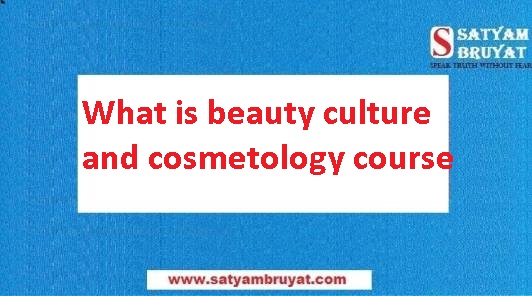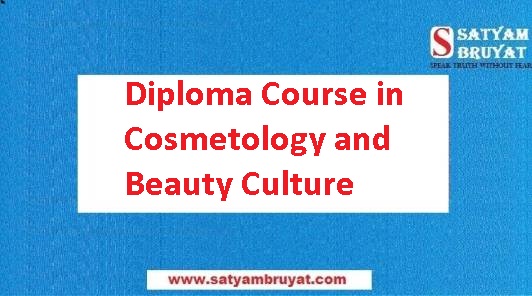What is beauty culture and cosmetology course
Here you will get complete details of beauty culture and cosmetology course. The art of cosmetology and aesthetic culture dates back to the Ice Age where haircuts and styling were practiced and tools were shaped with sharp flint, oyster shells or bone.
It is also said that early modern humans decorated themselves with natural dyes found in plants and fruits. Currently, cosmetology or so-called beauty trends have taken over the minds of people, thanks to social media.

From Youtube to Pinterest, from magazines to high billboards, every “fashion influencer” has a new trend to show off.
Cosmetology is the study and application of beauty treatments. Beauty treatments can be applied to any part of the human body, be it their face or toes.
Thus, there are various branches in which a cosmetologist can specialize such as aromatherapy, nail art and tattoos, henna, hair styling, hair removal, skin care, cosmetics and even herbal beauty care.
Becoming a cosmetologist can be a very fun and rewarding career. A cosmetologist is needed in many pharmaceutical companies, salons, and especially those working in beauty and wellness.
Clinical cosmetology is about advanced medical practices related to hair and skin care. Only qualified doctors (having MBBS/higher qualification) are eligible to pursue clinical cosmetology courses such as performing complex hair transplant treatments.
General cosmetology is all about using skin and hair care practices, which are commonly followed in salons, beauty parlors and spas.
Depending on your area of interest, there are two options available to achieve this-
- To do full time PG Diploma course after completing MBBS.
- To pursue a short duration job-oriented course like Diploma or Certificate course after completing 10th or 12th
Eligibility Criteria for Cosmetology and Beauty Culture Course
Candidates seeking admission in cosmetology course must fulfill the eligibility criteria for the respective courses as follows:
For short term course-
- Candidates must have passed at least 10th class from a recognized school.
- For advanced short-term courses, candidates should have completed a basic course in cosmetology or a relevant subject.
For Diploma course-
- Candidates should have passed at least 12th from a recognized school.
- Those who have completed certificate course after class 10th are also eligible to apply for diploma course.
For master course –
Candidates should have completed Advanced Diploma from a recognized Beauty and Makeup Institute.
Courses Offered in Aesthetic Culture and Cosmetology
Many beauty and makeup institutes in India offer cosmetology and beauty culture courses at different levels as mentioned below:
Diploma Course in Cosmetology and Beauty Culture

The Diploma courses along with eligibility criteria, fee and duration are listed below:
Postgraduate Course in Cosmetology and Aesthetic Culture
ISAS International Beauty School also offers the following postgraduate courses in Cosmetology
- Masters Program in Cosmetology – Two Year Program
- Post Graduate Diploma in Cosmetology – One Year Program
Cosmetology and Beauty Culture Course Topics and Syllabus
Beauty Culture and Cosmetology Admission Process
- The entrance test for admission to various professional programs of study is conducted every year in the universities on the dates fixed by the admission committees.
- One question paper of three hours duration has been prescribed for each program of study or each set of programs of study. The entrance exam is conducted for four days consisting of two three-hour sessions each day.
- Merit list will be prepared as per the criteria and policy of the Admission Committee.
- Candidates will have to appear for Group Discussion on a specified date based on their rank in the merit list which will be announced in advance on the notice board/website of the University.
- On the day of Group Discussion, candidates have to appear for Personal Interview as per the procedure of the University. The selection of the candidates is completely based on the performance of the Entrance Test, Group Discussion and Personal Interview.
Beauty Culture and Cosmetology Career Scope
As students studying M.Sc Cosmetic Science learn about bacteriology and chemistry to treat hair, skin and other aesthetic issues, they have diverse career options to choose from. Below are some of the areas where their expertise in the field will help them get a job and make a career in the same:
- To become a certified cosmetologist and have your own beauty and cosmetic clinic.
- Working as a professional cosmetologist in reputed hotels and resorts.
- After doing masters in cosmetic science, go to specialization course and work as researcher in laboratories.
- Work as a professional in salons and parlors and visit clients and inquire about their beauty related issues.
FAQs related to Aesthetic Culture and Cosmetology Syllabus
Q. What is beauty culture?
A. Beauty culture and cosmetics is the specialization of the beauty and wellness industry where one learns and uses styles, products, and technology to enhance one’s appearance.
Q. How is Beauty Culture Course different from Makeup and Beautician Course?
A. There is a subtle difference between beauty culture and makeup and beautician curriculum. In beauty culture, it can be makeup and products to enhance one’s appearance or it can be of different styles. However, it is purely beauty product for makeup and beautician courses to enhance one’s appearance.
Q. What is Cosmetology?
A. In layman’s term cosmetology deals with the research and technologies used in aesthetics to enhance one’s beauty and appearance. It can be aromatherapy, nail art, tattoos, henna, hair styling, hair laser treatment, skin care, cosmetics and herbal beauty care.
Q. What are some courses in Beauty Culture and Cosmetology?
A. There are various courses at all levels i.e. basic, advanced and master’s degree level in Aesthetic Culture and Cosmetology. Check out the list of courses in Beauty Culture and Cosmetology as shared in this article above.
Q. What are some good colleges offering beauty culture and cosmetology courses?
A. Top beauty schools like Lakme Academy, JD Institute of Fashion Technology, ISAS International Beauty School, Orane International, Pearl Academy, Tulip Academy and National Institute of Ayurveda offer beauty culture and cosmetology courses at various levels.
Q. What is the duration of Beauty Culture and Cosmetology course?
A. Beauty culture and cosmetology courses are offered at different levels, so the duration of the courses ranges from six days to one year.
Q. Which subjects are mandatory to study cosmetology?
A. There is no compulsory subject required to study aesthetic culture and cosmetology, therefore, candidates without maths and science can also pursue these courses.
Q. What is the fee for Beauty Culture and Cosmetology course?
A. The course fee for Aesthetic Culture and Cosmetology ranges from INR 1,200 to 25,000 depending on the level of the course.
Q. Are beauty culture and cosmetology courses offered online?
A. Yes, with the digital advancement, beauty culture and cosmetology are being introduced online through e-learning mode. However, one has to attend offline classes and projects for internship and practical learning.
Q. What are some good career options after completing Beauty Culture and Cosmetology course?
A. There are many career options available for those who complete the course in Beauty Culture and Cosmetology. It is the passion that matters to make a career, not just a course. One learns everything from a beauty culture and cosmetology course, including styling, beauty treatments, and tools and techniques, so exploring career options knows no bounds.
Q. What is the scope of beauty culture and cosmetology courses abroad?
A. Beauty culture and cosmetology are quite popular in India and abroad. With good skills and marketing strategy, one can make a good career in the field of beauty culture and cosmetology abroad.
